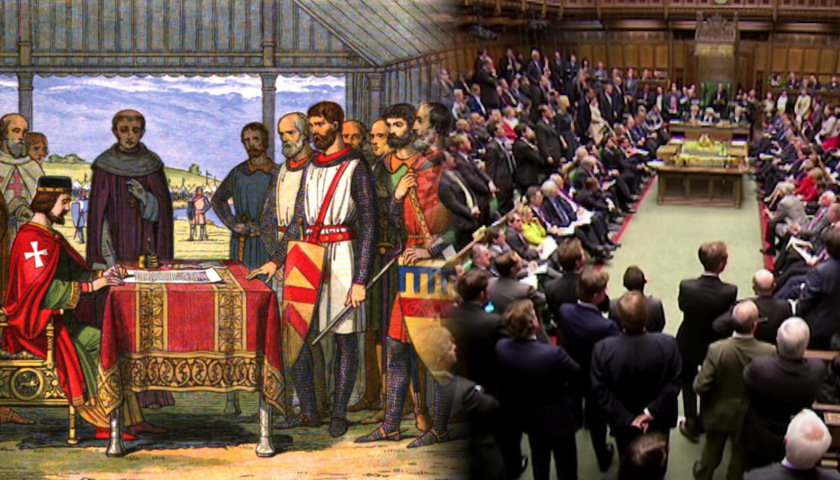by Robin Koerner
Many people regard Magna Carta as the first constitutional guarantee of the basic liberties of the English-speaking world.
Fewer people know that Magna Carta wasn’t imposed on King John just because he abused his power (which, after all, has been true of most kings and governments throughout history) but because he had handed away the sovereignty of England to a foreign governing institution in Europe. That institution was the Holy Roman Empire.
John had unilaterally handed England to Pope Innocent because earlier arguments with Rome had left England under an interdict (a kind of nationwide ex-communication). John was facing the possibility of an invasion from a strong, Catholic France with a papal blessing that would have made finding allies impossible and inevitably led to John’s defeat. To split his enemies and peel away the Church from France, John gifted the pope sovereignty over his entire country and leased it back as the pope’s vassal. For a time, Britain was ruled from Europe.
For the barons at Runnymede, that was the last straw: they responded to the fundamental transfer of power out of their country and forced Magna Carta on John.
History Repeats Itself
More than 500 years later, the (British) founders of the United States, in the very tradition of which Magna Carta was an early part, would make explicit the intuitive principle on which the barons had acted then and many have acted since: the power to govern is delegated by the people governed, with whom it entirely resides.
But that principle is so deep in the Anglo cultural psyche that even the barons who faced King John at Runnymede were not the first to state it in some way or another: the Charter of Liberties of Henry I had already formally established in the year 1100 that the rule of the king was by consent and that those who made the law were not above it.
By this long-standing principle, power is lent by the people, with whom it resides, for a limited time to those in government for the purpose of protecting the rights of those people. A British prime minister today has no more right to negotiate his country away to a foreign power than King John had to give the country away to a pope, and it makes no difference how the prime minister is chosen. No king or prime minister has any more right to do either than a tenant of my house has to sell or give my house away just because he is temporarily living in it. Power to govern is no more possessed by those who are allowed temporarily to exercise it than my house is possessed by the person temporarily allowed to live in it.
In the Brexit referendum, the British people chose to take their house back and evict the E.U. in its entirety. By the same analogy, Theresa May, the U.K.’s current prime minister, just happens to be the people’s “property manager” right now, and she has no right or mandate to thwart their instruction.
The question in the Brexit referendum was a simple one: should the United Kingdom remain a member of the European Union or leave the European Union?
The government’s refusal (at worst) or knowing failure (at best) to fully implement the second alternative Brits voted for (to leave the European Union) depends tacitly on the idea that it has the right to give away something that it, in fact, can never possess—the sovereignty of the nation.
Of course, that idea is false. Rather, the sovereign will was expressed in a referendum that everyone knew at the time meant exactly what the prime minister has since told the country it meant— an actual British exit from the European Union.
The British people also confirmed their clear understanding of, and intent in, the referendum result by voting overwhelmingly in the subsequent general election for parties that promised to honor it without qualification or equivocation.
And just in case it needs to be said (and it seems that it does): the reason why the referendum question did not list all of the conditions of Brexit is that exit, or “leaving,” to use the word on the ballot, is a rather simple all-or-nothing act.
Have you ever “left” anything while leaving behind a part of yourself? When have you told someone you are leaving your house but felt the need to specify that you are taking all of your limbs with you?
Never, and the very idea is absurd.
Unless the British Government Implements All of Brexit, It Isn’t Brexit
In voting to leave the E.U., the British were clearly voting to bring with them every part of their sovereignty that had been conceded to the E.U.—including the jurisdiction of their courts, the ability to make all of their laws, their territorial waters, and everything else.
So let’s say it directly. Any Brexit that doesn’t do all of those things isn’t Brexit.
There is no such thing as a “soft Brexit” any more than there is such a thing as a “soft” leaving your house in the morning or a “soft” pregnancy.
The drawing of a line at the giving away of governmental power is a very basic, human, and healthy self-protective instinct, which has been evident at many more points in history than just 1215. In 1258, for example, the Provisions of Oxford against Henry III, which established the parliament, were also a response to the King’s giving away power to a foreign European aristocratic class. Hundreds of years later, the Glorious Revolution would follow the exiling of a king on account of his desire to bring French law and religion to England. And as the normal, healthy act of a real demos(people), the result of the Brexit referendum is a similar reaction to a similar travesty.
It drew the line exactly where it has been drawn throughout history: to prevent those who are temporarily delegated power by one demos from giving away a kratos (power) that is not theirs, to those who are part of another demos altogether.
The British demos has demanded all of its kratos back.
Theresa May is now in very dangerous territory, both politically and morally.
The worst of it all is the deceit. May brought people along with her “plan” by declaring red lines in speech after speech… before turning them pink and eventually erasing so many of them altogether.
Kipling said it best:
The Saxon is not like us Normans. His manners are not so polite.
But he never means anything serious till he talks about justice and right.
When he stands like an ox in the furrow, with his sullen set eyes on your own,
And grumbles, “This isn’t fair dealing,” my son, leave the Saxon alone
Mrs. May is not just behaving as a Norman among Saxons: if her bypassing her own Brexit department to engage in backroom negotiations with Barnier is anything to go by, she’s literally colluding with them.
If the British government fails to deliver actual Brexit, it will have even more serious implications than leaving the country tied to the anti-democratic corpse politic of the European superstate: it will also be a self-inflicted wound, perhaps mortal over historic time, against the democratic body politic of Britain, which has taken a thousand years to mature.
Those who enjoy irony or historic parallel, or both, will appreciate the following:
After signing the Magna Carta, King John immediately appealed to the pope to annul that pesky referendum on and limitation of his power. Pope Innocent gladly obliged; he would have made a good president of the European Union today, refusing to accept any of the national referendums that rejected the European constitution.
That act of bad faith by John—rejecting the will of his people in favor of the will of his European overlord—caused the barons to revolt and open war to break out in England.
By that standard and the standard of most of British history, it is already past time for the British people who cared enough about their democracy to vote for Brexit to take to the streets to help Prime Minister May keep her promises.
Following Kipling, it is time for the Saxons to forget their manners in drawing the same line against their own government that they drew against the E.U.
Since the collusions negotiations with the E.U. are causing the British government such trouble, I have dredged up a little document that Mrs. May might like to take as a real starting point for the real “negotiations” that the motley Saxons will stand behind
It’s called the Declaration of Independence, which ironically was knocked up by some other Brits about 240 or so years ago when they were facing much the same challenge as the British are facing today. Perhaps it may help. With a few small changes, the pertinent paragraph is here:
That this United Kingdom is, and of Right ought to be, a Free and Independent state; that it is absolved from all allegiance to the European Union, and that all political connection between it and the European superstate, is and ought to be totally dissolved; and that as a Free and Independent kingdom, it has full Power to make its own Laws, Fish its own Waters, contract Alliances, establish Commerce, and to do all other Acts and Things which an Independent State may of right do. And for the support of this Declaration, with a firm reliance on the protection of divine Providence, we mutually pledge to each other our Lives, our Fortunes and our sacred Honor.
You know what to do, Brits. You’ve done it before.
And for fundamentally the same reason.
– – –
Robin Koerner is British-born and recently became a citizen of the USA. A decade ago, he founded WatchingAmerica.com, an organization of over 200 volunteers that translates and posts views about the USA from all over the world, works as a trainer and a consultant, and recently wrote the book If You Can Keep It.




